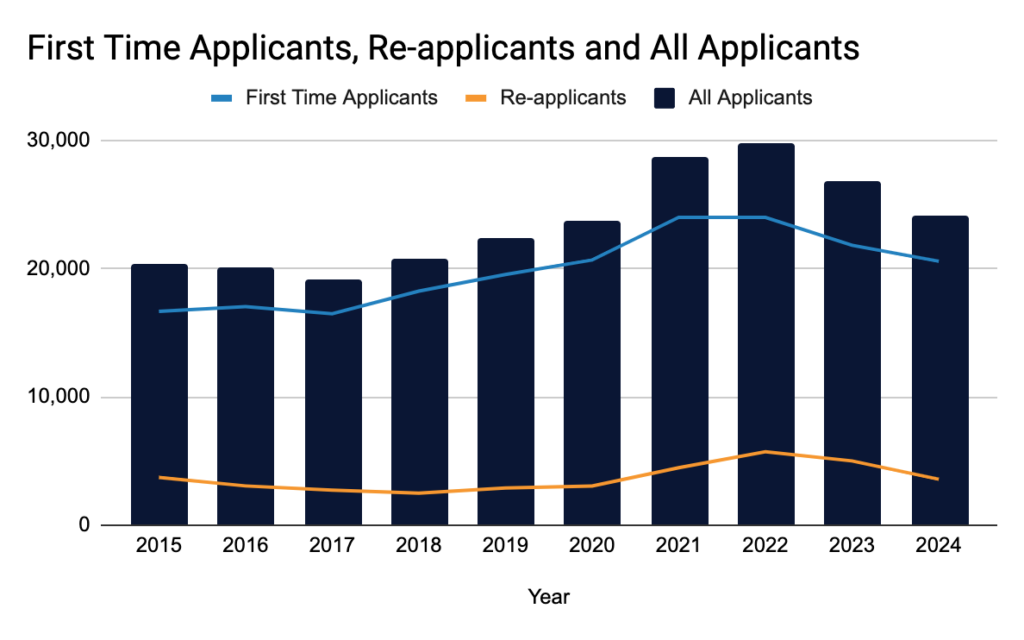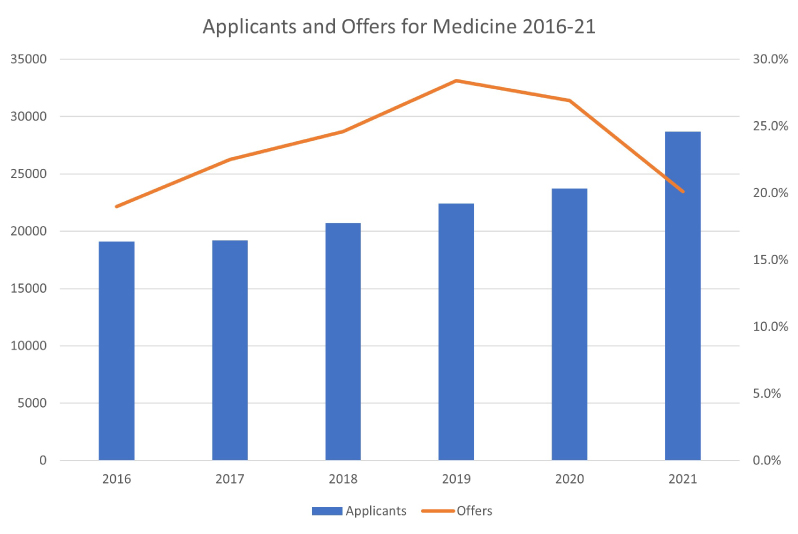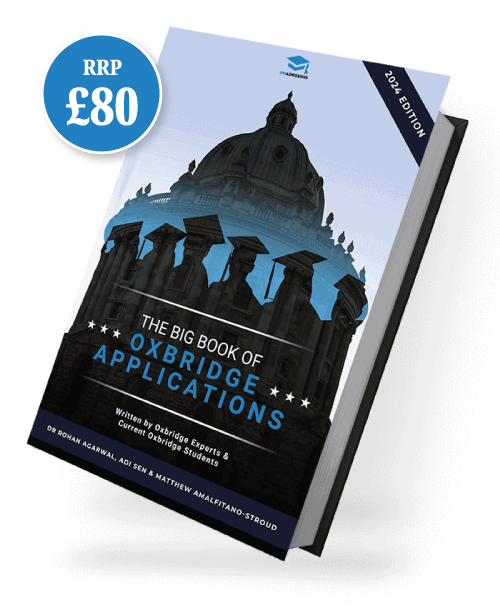Over the last few years, Medicine has become more competitive, but why is this the case and how do I compete to achieve an offer?
Following on from our 10-year review to determine if Oxbridge has become more competitive, we decided to write a separate review for Medicine. Using the last few years of admissions statistics, we go through why Medicine is competitive, why it is becoming more competitive and how to compete with your fellow applicants.
Let’s start by answering one of the biggest concerns for medical applicants:
Is Medicine Competitive?
Medicine is notorious for being one of the most competitive degrees in the world.
UK Medicine Applicant Success Rates
For some perspective, here are the 2023/24 applicant success rates of some of the top Medicine degrees in the UK.
These Medical School success rates are incredibly low, although Cambridge, the current highest ranked medical school, has the highest success rate out of all of these! To provide some context, when looking at other degrees from Oxford, one of the most competitive universities in the world, popular degrees like Classics see a nearly 40% success rate, over 4 times higher than the Medicine success rate.
We should add that Undergraduate Medicine is still not the most competitive degree at Oxford and Cambridge (Oxford Economics and Management has an offer rate of 6% and Cambridge Computer Science has an offer rate of just over 9%).
We can safely say that Medicine degrees are very competitive, but how has this changed over the last few years and is Medicine actually becoming more competitive?
With Medicine only getting more and more competitive, a strong application is essential to succeeding.
Medicine is notoriously competitive and it helps to have an edge. Our expert tutors are on hand to help you achieve your dream offer.
Our students’ success rates for Medicine vastly outcompete the national average (our non-Oxbridge Medicine success rate is 74%).
To ensure you can compete with fellow applicants, we’ll help you craft the perfect Personal Statement, achieve a highly competitive UCAT score and teach you how to Interview effectively – covering all areas of your Medicine application.
Discover our Medicine Premium Programme by clicking the button below to enrol and triple your chances of success.
Is Medicine Becoming More Competitive?
Medicine is absolutely becoming more competitive. From using data by the Medical Schools Council and data from offer rates, we can review the last 6 years of UK Medicine admissions statistics:
Medicine Admissions Statistics
Let’s put this data into a more visual format:

To start with, we can clearly see that over the last 10 years, the number of applicants has been gradually increasing until its peak in 2022. After reaching nearly 30,000 applicants in total, application rates have been dropping over the last two years. In 2023 (for 2024 Entry), medicine applications saw a nearly 20% compared to two years prior bringing the figures back to near 2020 Entry levels (which was pre-pandemic)
It is important to take into account the high number of re-applicants deferring entry due to COVID in this period. The increased number of applicants from 2021 onwards was also attributed to this. 2020 (2019 technically) was the last pre-pandemic year and the number of re-applicants in 2021 was 1,570 more than in 2019.
So how has this affected offer rates?

Although we don’t have complete data from all years, we can still learn something from the following. As shown in the figure above, as the number of applicants increases, the offer rate decreases, particularly in 2021 where we see a nearly 7% decrease in offer rates between 2020 to 2021. This is in the space of just one year.
You might be wondering why this is the case. As the MSC suggests, the consequence of this rise in applications is that the selection criteria universities use in 2021 are likely to be stricter than those used in 2020. Therefore, with more students applying to Medicine, the stricter selection criteria imposed by medical schools are likely to have contributed to this large decrease in applicant offer success rates, combined with limited spaces available and a growing cohort of applicants.
To explore this further it is worth understanding why Medicine is such a competitive degree.
Access "The Big Book Of Oxbridge Applications" For FREE
Getting into Medicine at Oxbridge is especially difficult, so download The Big Book Of Oxbridge Applications for free here to learn about every step of the application process. Through over 350 pages, you’ll find:
- Over 40 admissions test practice questions
- 28 example Oxbridge Personal Statements
- Interviews with Oxbridge students and graduates
- Additional downloadable resources
Fill in your details below to claim your digital copy today!

Why Is Medicine So Competitive?
Medicine is notorious for being competitive. We have said this before and there are multiple reasons why it’s hard to achieve a place to study Medicine. Here are some of the different reasons:
The Applicants
A big reason why Medicine is competitive is down to you and your fellow applicants. The standard of today’s applicants is incredibly high, this means that you have to be the best of the best to stand a chance of getting into the top medical schools.
Using A-levels as an example, in the Oxford Medicine 2019 cycle:
- 1,712 applicants applied via UCAS.
- 162 applicants were given an offer.
- But if you look at the A-level predicted grades of the applicants who applied, 156 applicants were predicted 4 or more A*s.
- When you consider that 13% of the total applicants took the IB, it is highly likely that not everyone with 4 or more A*s actually received an offer.
Of course, A-levels are just one part of the application process, but they are a good indicator of the standard of students applying to Medicine. However, most successful applicants will go above and beyond to earn their place.
The Number of Applicants and Places Available
The number of applicants and the places available impacts the competitiveness of Medicine. As suggested earlier, the increasing number of applications means that the selection criteria universities use is likely getting stricter each year.
Limited Resources
The places these applicants are applying too are already very limited for a number of reasons. For example, there are limited resources available at medical schools, high costs for teaching and most schools lack the alternative of funding expensive new campuses to cope with the growing number of applicants. The pandemic has not helped with the surge in students wanting to be doctors but even without the pandemic, it is clear that there has been a gradual growth in the number of applicants for Medicine anyway.
Limited Places
Another factor related to the number of applicants is the consistent number of spaces available at UK medical schools. Although there are a larger number of applicants applying each year than in previous years, the number of spaces available is often the same or it does not change enough to match this increase in candidates. This results in lower success rates.
We have seen this very clearly with Oxford University as in 2011, Oxford had 17,346 overall applicants but made 3,481 offers across all their subjects. In 2023, Oxford had 23,211 applicants (nearly 5,900 more applicants) but only made 3,219 offers (262 fewer offers than in 2011).
As Oxford and many other universities/medical schools have decreased or barely increased the number of places available, offer rates at Oxford have fallen by around 5.8%. We have seen similar patterns with Cambridge so compared with a decade ago, in general, it is now around 30% more difficult to get into Oxbridge.
There are, of course, many other reasons why Medicine is so competitive, but our aim here is not to make you feel like applying is pointless after seeing how difficult it is to get in. There’s no denying that it is competitive but it is not impossible, so how do you give yourself the best chances of success?
Ready to start your application
process?
Applying to Oxbridge is notoriously competitive. For some degrees, as few as 6% of all applicants receive an offer. Our Premium Programmes are tailored to triple your chances of gaining an offer from your dream College.
Elliot shares his experiences of working with us and how we helped him to achieve Oxbridge Medicine success.

How To Be Competitive For Medical School
Here are 3 key tips to improve your chances of getting into medical school:
1. Understand what Admissions Tutors look for in their medical students
Having a solid understanding of what Admissions Tutors are looking for will help you with writing your Personal Statement and knowing what is likely to come up in the Interviews. Most universities will provide a few key personal characteristics that show suitability for Medicine, such as on Oxford’s Website.
2. Start preparing early
Although it might feel silly to start working on your Medicine application at the beginning of the year when you have months to go before the first UCAT or UCAS deadline, planning the time now and starting the process will help you spread out your preparation so you can avoid stressful last-minute revision.
If you want to compete with fellow applicants, then the best way is to utilise the time you have now before your final deadlines. This gives you the opportunity to tackle the topics you find tricky in your Admissions Tests way before you sit them, and you’ll have ample time to really nail your Personal Statement by doing multiple redrafts.
3. Reflect on your work experience and wider reading
For any work experience you undertake, you must keep a journal and write about your experiences, thoughts, feelings, anything that you learnt and what you did to follow up after the experience, such as researching more into a particular medical field.
Reflecting on your experience could be you mentioning in your Personal Statement how watching a nurse comfort a patient really confirmed your desire to work in the profession, or how speaking to hospital porters helped build your understanding of the realities of working in healthcare.
By not reflecting, you do not demonstrate your capacity to learn and improve (reflecting is a large part of the profession) and you miss out on showcasing your personality.
Conclusion
Medicine is clearly a competitive degree and the data suggests that it is only getting more competitive. The reasons for this stem from factors such as the increase in the number of applicants, the limited spaces available which are not necessarily growing with the volume of candidates, and the high standard of applicants.
For those of you reading this that are applying next year or in a few years’ time, there is no need to panic and change your life plans because of the low success rates. The aim of this article is to emphasise the increasing competitiveness of medical schools, not to put you off.
We want to stress the importance of preparing early and preparing properly. This means structured learning through planning your time so you can focus on areas you find the hardest way before exam dates. Starting early will also provide you with ample time to organise and gain work experience and redraft your Personal Statement.
Good luck with your application and if you are looking for effective structured support, please get in touch with our Admissions Consultants.
Ensure your Oxbridge Medicine application stands out from the crowd.
Applying to Medicine is becoming more competitive, but we’ll ensure you can compete with fellow applicants.
UniAdmissions Oxbridge Medicine Programme is designed with the sole focus of getting you your dream offer. Students enrolled on our Programmes have triple the chances of success. Not applying to Oxbridge? Click here for our non-Oxbridge medicine premium programmes.
Get started with your Medicine Premium Programme today and triple your chances of success!








